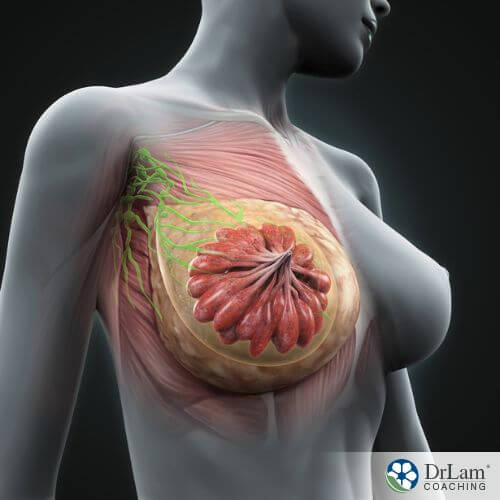 The most recent research suggests that there’s a link between the hormone known as melatonin and breast cancer. And this link may suggest a new way forward in the fight to prevent and eliminate breast cancer. It may even work to protect you against tests that involve radiation, which can be very reassuring for women who need to have regular mammograms or are undergoing cancer therapies.
The most recent research suggests that there’s a link between the hormone known as melatonin and breast cancer. And this link may suggest a new way forward in the fight to prevent and eliminate breast cancer. It may even work to protect you against tests that involve radiation, which can be very reassuring for women who need to have regular mammograms or are undergoing cancer therapies.
However, it's important that you don’t try to eliminate breast cancer through alternative therapies. The only proven way is through medical treatment, so if you find a lump in your breast, then see your doctor immediately.
With that in mind, let’s take a look at what the research indicates.
Breast cancer affected around 2.3 million women around the world in 2020 and caused 685,000 deaths. It’s one of the most common cancers in the world, particularly in women. It can occur in any woman, but is most common as women age.
Breast cancer usually grows in the lining cells of the ducts or in the lobules of the breast’s glandular tissue. When it’s at this stage, there are usually no symptoms. But eventually, the cancerous cells can progress and invade the surrounding breast tissue and even spread to the nearby lymph nodes.
There is no single cause of breast cancer. However, there are certain risk factors that can increase your risk of developing breast cancer including:
Estrogen is also considered to be a risk factor for breast cancer. This group of female sex hormones performs essential roles in male and female bodies. However, these hormones also increase your risk of certain types of cancer.
Estrogen attaches to certain types of receptors in your cells to aid normal cell function and growth. However, many breast cancers are hormone receptor-positive, which means that they need estrogen to grow. This means conditions and situations that result in high levels of estrogen in your body may increase your risk of breast cancer. Some factors which can increase your estrogen levels and put you at higher risk of estrogen-related breast cancers are:
Obviously, the balance of hormones in your body is extremely important, especially when it comes to estrogen. It’s this hormone that may explain the link between melatonin and breast cancer.
Melatonin is a hormone that’s produced naturally in your body. The levels of melatonin in your body rise and fall throughout the day and perform a number of different functions. One of the most important functions is to regulate your body’s circadian rhythm.
You can also take melatonin in supplement form. Because it can regulate your body’s sleep cycle, it’s often used to help correct poor sleeping patterns. There is also evidence that melatonin can help:
Unfortunately, there’s little information on the long-term effects of using melatonin. This makes it a risky supplement for long-term use. In the short term, melatonin is generally safe, but may cause side effects such as:
So, if you notice any side effects like this, then stop use and talk to your doctor. You should not use melatonin if you’re taking medications for diabetes, seizures, or blood thinning. It may also interfere with reproductive hormone levels in women. This hormone is not recommended for people with:
The amount of melatonin used in supplements varies widely depending on why it’s being used. However, most medical professionals suggest taking a range between 0.5 milligrams and 5 milligrams per day.
 Preliminary results do seem to show that there are several important reasons why this hormone is important in breast cancer.
Preliminary results do seem to show that there are several important reasons why this hormone is important in breast cancer.
A single study has shown that melatonin therapy may increase estradiol levels in women. Estradiol is a form of estrogen, and ongoing high levels of this hormone have been linked to an increased risk of breast cancer. This is one reason for caution when it comes to using estrogen for cancer prevention or elimination.
However, numerous other studies show that women with low melatonin levels, which usually occur because of poor sleeping patterns, are at increased risk of breast cancer. In fact, poor sleep and shift work are well-accepted risk factors for breast cancer.
Melatonin may help protect against breast cancer or the spread of breast cancer cells by:
However, just because there seems to be a link between melatonin and breast cancer, it doesn’t necessarily mean that you can or should use melatonin supplements to prevent or eliminate it. Always see your doctor if you have any suspicious lumps, as medical therapies such as chemotherapy or radiotherapy are still the best option for recovery. However, these discoveries do suggest that melatonin could play a role in breast cancer prevention and elimination in the future.
Many of the studies exploring the link between melatonin and breast cancer used oral supplementation. These studies used high doses of melatonin (10-200 mg daily), which is much higher than the official recommended dose. However, melatonin is demonstrated to be nontoxic at pharmacological doses, though there are always exceptions. At low doses (1-10mg), melatonin acts more on sedation, but at higher doses (10-200mg), whether orally or rectally, melatonin's primary action is as an antioxidant.
If you have trouble taking supplements orally, then you can take melatonin in other ways. Taking melatonin rectally or vaginally are both good alternatives to oral medication. Transdermal melatonin, which means the medication is absorbed through the skin, usually via a patch, results in slower absorption but longer lasting effects. This means it may not be appropriate if you’re looking for high circulation levels and immediate effects.
Never try to prevent or eliminate cancer on your own by taking high doses of any supplement without medical supervision and guidance. Taking high doses of any supplement increases your risk of an adverse reaction, so always talk to your doctor and take their advice.
Melatonin may also help protect your body against radiation. Radiation is used for various types of cancer therapy such as radiation therapy and it’s also present when you have a mammogram or other types of radiological imaging procedures. This radiation can have adverse effects on the body, causing increased free radical production and cell damage.
Melatonin at high doses is a free radical scavenger and encourages the release of antioxidative enzymes. This may be why studies have shown that melatonin can reduce oxidative stress and inflammation in the tissues. It can also help protect you against radiation enteritis, a type of inflammation that occurs in the intestines after radiation therapy is aimed at that general area.
In the studies, these protective effects occurred when melatonin was administered prior to radiation exposure. So, talk to your doctor if you’re concerned before being scanned.
 Adrenal Fatigue Syndrome (AFS) is brought on by stress. Lots of people are stressed in the modern world and experience a wide variety of stressors. Lack of sleep because of shift work or poor sleeping patterns is a very common source of stress these days. These stressors can result in imbalances with hormones such as melatonin.
Adrenal Fatigue Syndrome (AFS) is brought on by stress. Lots of people are stressed in the modern world and experience a wide variety of stressors. Lack of sleep because of shift work or poor sleeping patterns is a very common source of stress these days. These stressors can result in imbalances with hormones such as melatonin.
The NeuroEndoMetabolic (NEM) stress response is supposed to resolve stress. Usually, this occurs quietly and in the background without you even being aware of it. But because stress in the modern world is often chronic and ongoing, the NEM stress response remains active over the long term. This causes the adrenals to become fatigued and start to malfunction. The adrenals excrete cortisol, one of the most essential chemicals when you’re stressed. The resulting adrenal fatigue and the going high levels of cortisol can negatively affect organ systems throughout your body.
This is important information for anyone who’s concerned about melatonin and breast cancer as AFS is strongly associated with sleeping and hormonal problems that may increase your risk of developing this kind of cancer. Imbalances in the Hormone Circuit may also increase your risk of these kinds of issues.
The Hormone Circuit is an important part of the NEM stress response and is responsible for the balance of hormones in your body. It includes the adrenal glands, the thyroid, and the ovaries in women or the testes in men. When you’re stressed, this circuit usually slows down, as reproduction isn’t that important during periods of stress. This is why many people with AFS experience infertility, a lowered libido, and unbalanced hormones.
However, when you have AFS and are stressed over a long period, this slow-down can become permanent. As a result, the components of the Hormonal Circuit become unbalanced. When you have AFS and your Hormonal Circuit is unbalanced, you may experience sleeping problems. This may put you at higher risk of breast cancer.
However, there is a bigger issue that occurs in AFS that may increase your risk of breast cancer. Estrogen dominance is very common in women with AFS. This can occur when the balance between estrogen and progesterone, the hormone that naturally balances estrogen, is lost. This is why you need to be so careful to work with your medical practitioner to balance your hormones naturally when you have AFS.
If you suspect that you have breast cancer, then see your doctor immediately and without delay, because early intervention is key to a good outcome. However, if you’re concerned about this issue and want to take proactive steps, then the link between melatonin and breast cancer may offer you a safe way to help prevent breast cancer. Here’s what you should do about this:
For more information on supplements that may help prevent or reduce various health conditions including cancer and estrogen dominance, talk to our team at +1 (626) 571-1234 or click here.
There isn’t enough information at this stage to fully understand the link between melatonin and breast cancer. However, because melatonin is linked to sleep, and good sleep is absolutely essential for every aspect of your health, low melatonin levels are something that you should correct as soon as possible.
